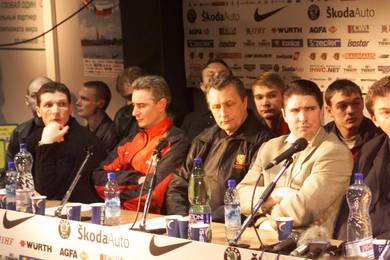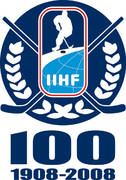Story #73
May 14, 2000 - St. Petersburg, Russia
It started really well. The best team that Russian hockey had assembled since the glorious Soviet days, ran over France 8-1 on opening day of the 2000 IIHF World Championship in St. Petersburg. This meant that a Soviet/Russian team had never lost a World Championship game at home, riding a streak of 36 consecutive games without a loss, dating back to 1957.
The Russian fans were sure that this team, loaded with NHL stars like Pavel Bure, Maxim Afinogenov, Alexey Yashin, Sergei Gonchar, Alexei Zhamnov, Alexei Zhitnik, Dmitri Mironov, Andrei Kovalenko and Valeri Kamensky, simply couldn’t fail. In total 14 NHLers came home to join the team that was on a mission to win the nation’s first World Championship gold since 1993.
But already in the next game the star-studded Russians were shut-out by USA, 3-0 and the unbeaten home streak that had lasted for 43 years, through four World Championship events, was over. What’s even worse – the loss to the Americans happened on May 1, traditionally a very important day for Russian people, symbolically significant as a day of celebration for workers across Europe. Another blow happened two days later when Switzerland rallied back from being 2-1-down to win 3-2, the first ever Swiss win against a Soviet or Russian team in a men’s hockey championship.
In just four days the fans’ sentiments had changed from joyous to furious. But there was still time for redemption. The sole win against France was enough for the Russian team to qualify for the next round. But things would only from bad to worse. In the opening game of the Qualifying Round, Russia lost to Latvia 3-2, in a game where the former Soviet goalie Arturs Irbe played the game of his life. For the hockey fans from Latvia, a former Soviet republic, this was the best day of their lives.
Now, after three consecutive losses, Team Russia’s qualifying for the quarterfinal was in serious jeopardy. They badly needed wins against both Belarus and Sweden. The game against Belarus (another former Soviet republic) on May 7 will probably forever be remembered as the lowest point in the country’s hockey history. Vladzimir Tsyplakov’s goal after twelve minutes was enough. A fundamentally demoralized team full of hockey millionaires could not overcome even this setback. The game ended 1-0 for Belarus and the fans at St. Petersburg Ice Palace booed their players mercilessly.
The team and head coach Alexander Yakushev were chopped into pieces by Russian media. “The worst St. Petersburg has seen since 1917” shouted one headline and another publication called the players “Hollywood stars, not athletes”. But the media wasn’t done. In an action that has no precedence in the world of team sports, the home media demanded that the entire team and coaching staff would show up at a press-conference to publicly apologize for the showing which was considered as a national embarrassment.
The Russian Ice Hockey Federation had no other choice than yield to the demands and to subject the entire team to this humiliation, where many of the Russian scribes acted more as fans than as covering journalists. Some of the best players in the world sat there and the only thing that they could say was “we are sorry”.
The last game against Sweden proved meaningless. Despite a 4-2-win Russia finished 11th – between Norway and Italy. What was predicted as a revival of a once great national team on home ice, ended with an all-time low.
As part of the IIHF's 100th anniversary celebrations, www.IIHF.com is featuring the 100 top international hockey stories from the past century (1908-2008). Starting now and continuing through the 2008 IIHF World Championships in Canada, we will bring you approximately three stories a week counting down from Number 100 to Number 11.
The Final Top 10 Countdown will be one of the highlights of the IIHF's Centennial Gala Evening in Quebec City on May 17, the day prior to the Gold Medal Game of the 2008 World Championship.
These are the criteria for inclusion on this list: First, the story has to have had a considerable influence on international hockey. Second, it has to have had either a major immediate impact or a long-lasting significance on the game. Third, although it doesn't necessarily have to be about top players, the story does have to pertain to the highest level of play, notably Olympics, World Championships, and the like. The story can be about a single moment — a goal, a great save, a referee's call — or about an historic event of longer duration — a game, series, tournament, or rule change.
|
 |
Click here for the 100 Top Stories
|










